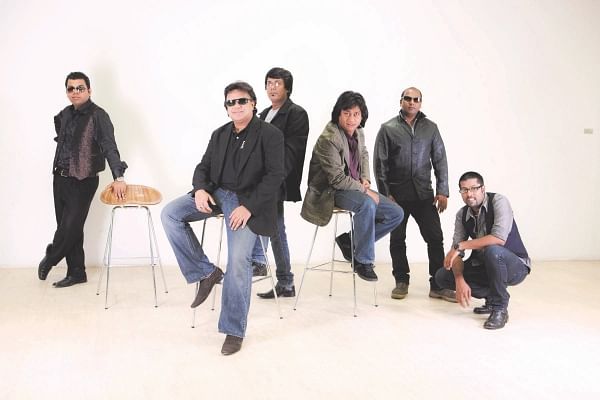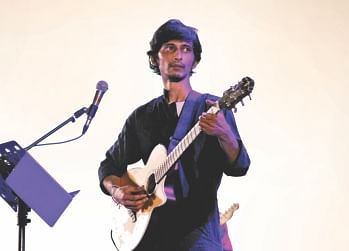| Home - Back Issues - The Team - Contact Us |
 |
| Volume 11 |Issue 27| July 07, 2012 | |
|
|
Music CELLIN' SONGS Musicians and bands have recently joined forces with telecom operators to release their latest albums, but can the music industry fight piracy? Naimul Karim
Browsing by the music archive of Bangladesh, people are bound to come across a number of 'one-hit wonders'. It can be safely said that the music industry, over the last few decades have seen a number of artistes gradually fade away from the music scene. While the traditional school of thought may argue that only good musicians survived the so-called 'eliminatory-phase', several artistes however claim that the lack of financial incentives in the field discouraged many musicians to continue. “Piracy is dangerous. It doesn't allow the artist to receive the deserved amount of money. Websites that put up songs for free cause majority of the damage," says Shafin Ahmed, vocalist of Miles. The legendary band, in a bid to beat the pirates, joined hands with GrameenPhone last year and released a number of new songs. Explaining the copyright act in Bangladesh, Chisty Iqbal, a lawyer who deals in cases specifically in this field says, "The copyright act itself does not give any formula or breakdown as to how the sale proceeds, profits or royalties shall be shared or provided. This is a commercial arrangement between the authors (composer/lyricist), the artist and the music label. Until recently, the customary practice was for a music label to make a one-off payment to the Artist and thereby usurping all the legal and commercial rights of the authors and retain any or all profits resulting from the sales of the album in every format possible, an arrangement which falls outside the legal framework.” The inability to earn through music was one of the major reasons why many bands discontinued. "Our first album was a major hit. A number of copies were sold and songs like 'Brishti' and 'Kothay' became very popular. Unfortunately we don't have the rights to the songs, the label does," laments Nafiz Al Amin, former drummer of Raaga.
Many artistes feel that the trend of digitally releasing albums, through telecom operators, can possibly counter this practice. Musicians, including Miles and Arnob recently signed contracts with telecom companies to release their latest albums. The songs were available to the respective telecom subscribers much before the release of the CDs. Explaining the process of releasing albums through telecom companies, Ahsan Ahmed Chowdhury from Grameenphone says, "For every download that a subscriber makes, the money goes to the artistes and their labels. The good thing about this is that the songs can only be heard on the handset that they are downloaded in. They cannot be copied or be heard in any other player." Giving an example, he says," When we released the album 'Jam' by Souls, our subscribers could download all the tracks. They could also set them as welcome tunes. Either way, for every download, the members of Souls received a certain amount of money. And the songs could be downloaded as long as they permitted us to." The digital rights of songs, however, differ from contract to contract. For instance, in certain agreements, the revenue might be split between the artiste, the music label and the content provider. In other cases, the artist might be the soul owner. Commenting on the system, musician Bappa Majumdar says," If it's a transparent deal where the company clearly shows the amount of downloads and revenue earned, then one can go for it." He, however, is of the opinion that a music artist must have some sort of a physical evidence of his songs. "It may be a cassette, CD or even a record, but there must be something solid," he says. "I think it's a great move. It helps in reducing piracy and the musician gets to earn through his songs," says Shafin Ahmed. Certain musicians think that having an ownership of their songs, albeit in the digital format, is in itself a positive change. "I can at least claim my own song through this system. And who knows this maybe just the beginning. Maybe the royalty system can expand in the future," hopes Michael Gomez, bassist of the band Shunno. While releasing albums digitally may be the way forward in an industry that is otherwise plagued with piracy, certain artists, however, still prefer to stick to the older mediums. "The digital market has bloomed only because we have lost faith in our music production companies. In my opinion though, the sound quality of the songs released in phones aren't up to the mark. It may provide revenue, but what's the point of releasing a song if people don't get what note you're playing…," says Saef Al Nazi Cezanne, bassist of Artcell. He further says that the exclusivity in these deals doesn't allow many music lovers to get access to the songs. "By signing a contract with a telecom company, I'll be limiting my songs to only a section of the subscribers and I don't think that's fair," he adds. Reiterating Cezanne's views, Chisty Iqbal says, " Since there appears to be very little transparency and accountability in the audio industry, the more commercially successful artists have embraced mobile technology to allow their music to reach the mass, something which appears to be more appealing day by day especially considering that physical CD sales have dropped considerably due to rampant piracy in the country and abroad." He is of the opinion that the new platform is inevitable despite the complaints regarding the quality of the sound. Whether the concept of releasing albums with telecom companies will gain momentum or not is a question that only time will answer. Can this be the beginning of a new phase where music artists can survive solely on their records? Considering the dire conditions of our music industry, one hopes that a proper system will arise. As Iqbal puts it, "We have to understand that this is a multi million dollar industry which we need to revive not only to cultivate and nurture our existing artists but also ensure our cultural and musical heritage is sustained in the long run." Copyright
(R) thedailystar.net 2012 |

